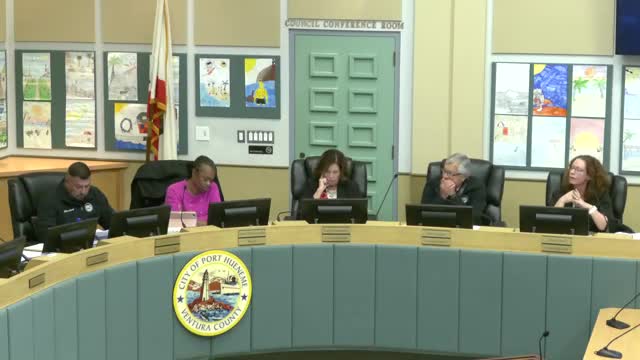Port Hueneme council directs staff to revise short-term rental rules, removes separation requirement
Get AI-powered insights, summaries, and transcripts
Subscribe
Summary
After a multi-hour public hearing, the council voted to direct staff to amend the proposed short-term rental ordinance’s posting requirement and to remove a proposed spacing (separation) requirement while returning with alternatives. Council split on the change and left fees and final wording for future revision.
Councilmembers on Nov. 17 directed city staff to rewrite parts of a proposed short-term rental ordinance — notably to amend exterior-sign posting requirements and to remove a spacing (separation) requirement — and to return with revised ordinance language for introduction.
City staff framed the ordinance as a “balanced approach” intended to establish a permitting system, good-neighbor operating standards (quiet hours, trash and parking rules, occupant limits), a required local contact for complaints, transient occupancy tax tracking and enforcement tools. Staff also recommended a 10% citywide cap on short-term rental (STR) units and described risks that a separation requirement might trigger additional review by the California Coastal Commission.
During more than two hours of council debate and about an hour of public testimony, residents, HOA representatives and STR operators offered conflicting views. Several HOA representatives urged stronger enforcement, occupancy limits and a robust complaint-response system; property managers and STR hosts asked to limit signage and fee burdens and suggested alternatives such as neighbor postcards, interior posting for first-responders or signage only when a rental is occupied. Paul Quigley of STRFreedom.org asked for clearer minimum-stay wording and longer renewals for operators with good records; Jan Burke urged steep, escalating penalties for noncompliance to deter commercial-scale gatherings.
Council members debated the utility and public-safety implications of signage and whether to retain a 100–200-foot separation standard used by some jurisdictions. Supporters of removal said separation could unfairly prevent a resident from renting a home in a time of need and risk Coastal Commission rejection; supporters of retention said spacing protects small HOAs from saturation.
After a procedural rescission and a re-opened motion, the council approved the staff approach amending the posting requirement and removing the separation requirement. The final vote passed with Council Members Hernandez and Mayor McQueen LaJeune recorded as voting “no.” The council also considered a motion to lower renewal fees after the first year; that fee-reduction motion failed.
City staff said they will return with a revised ordinance that narrows posting options (staff flagged postcards, interior posting or signage while occupied as possible alternatives), clarifies parking and occupancy definitions, and provides enforcement language that ties permit revocation to verified violations. Staff noted the ordinance must account for properties and rules within the Coastal Zone and the possibility that the Coastal Commission could require changes, which could delay enforcement in coastal addresses.
The council left intact the idea of enforcement tools (strikes system, permit revocation after repeated violations) and the requirement that operators collect and remit hotel/transient occupancy tax. Councilmembers asked staff to propose clearer language for minimum stays, clarify warranty/inspection standards, specify who makes waiver determinations, and outline a grandfathering approach if necessary.
Next steps: staff will draft the revised ordinance per council direction and bring it back to council for introduction and a subsequent second reading and vote.
